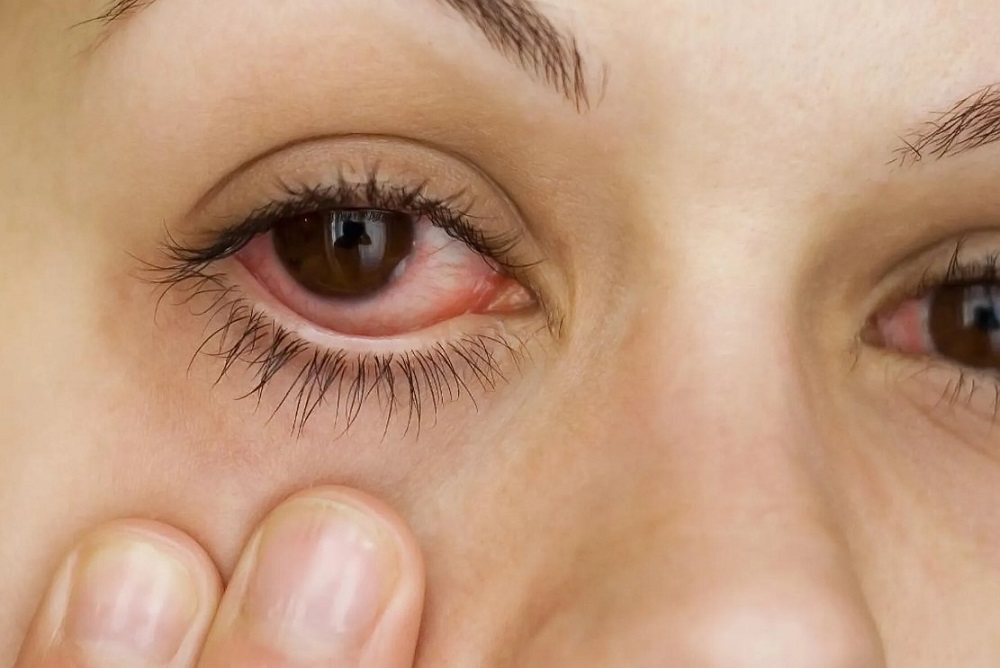Pink eye, also known as آشوبِ چَشَم, is a viral infection of the eyes that is on the rise nowadays. You may have heard to steer clear of infected people to avoid getting pink eyes. That’s because it is really distressing.
Imagine your eyes turning pink and hurting a lot. It’s like there’s something sharp inside your eyes, and even blinking is painful. Your eyes look weird and red, and your friends might avoid you because they are scared of catching the virus. That’s what pink eye does to you. It’s a BIG annoyance.
Fortunately, you don’t have to suffer for long. Although you can’t avoid pink eye if you have caught the virus, you can try some effective remedies to overcome it.
Table of Contents
What is Pink Eye?
Pink eye disease, also known as “سرخ آنکھ” or “چشموں کی لالی” in Urdu, is a common eye condition affecting people of all ages, even newborn babies.
One of the most noticeable symptoms is the pink or reddish coloration of the white part of the eye. The conjunctiva, the thin, transparent layer that covers the white part of your eye and lines your eyelids, becomes inflamed.
Conjunctivitis can happen due to various factors, such as viruses, bacteria, and allergens. The type of conjunctivitis you have determines the best course of treatment.
What Causes Pink Eye?
Firstly, you should understand pink eye causes and how it spreads. Here are some common ways the virus transmits:
Viral Conjunctivitis
It often occurs due to the same viruses responsible for the common cold.
Viral conjunctivitis is highly contagious and can spread through sneezing, coughing, or contact with contaminated surfaces.
Bacterial Conjunctivitis
Bacteria like Staphylococcus or Streptococcus are behind this type. It is also highly contagious and spreads through contact with infected eye secretions.
Allergic Conjunctivitis
This type results from exposure to allergens like pollen, pet dander, or dust mites. It is not contagious and usually occurs in response to specific triggers.
How Does Having a Pink Eye Feel Like?
Pink eye symptoms are easy to recognize. Common symptoms include
- Redness: The whites of your eyes may appear pink or red.
- Irritation: Your eyes may feel itchy or gritty as if there’s something in them.
- Watery or Thick Discharge: You may notice a clear or colored discharge from your eyes.
- Sensitivity to Light: Your eyes may become more sensitive to light, causing discomfort.
- Crust Formation: You might experience crusty eyelids due to dried discharge in the morning.
Suggested Read: How to Get Rid of Crusty Eyes in the Morning?
How to Get Rid of Conjunctivitis Fast?
You cannot avoid pink eye. If you have got the virus, you will get conjunctivitis. But you can put some effort into getting rid of this annoyance.
Here are some options:
Apply Warm Compresses
Applying a warm compress to your closed eyelids can help soothe your eyes and reduce redness.
Use a clean, lint-free cloth soaked in warm water for this purpose. Press it gently against your eyes for 5-10 minutes several times daily.
Put Saline Eye Drops in Your Eyes
Saline eye drops can help flush out irritants and discharge from your eyes. They can also provide relief from dryness and discomfort.
Try Honey
Honey’s natural antibacterial properties may prove beneficial for bacterial conjunctivitis.
Mix a teaspoon of honey in a cup of warm water, allow it to cool, and then use it as an eye wash. Be sure to use pure, organic honey.
However, consult your doctor before using this remedy.
Tea Bags Can Help
Tea bags, particularly chamomile or black tea, can help reduce inflammation and soothe irritated eyes.
Brew the tea, let the tea bags cool, and then place them on your closed eyelids for 10-15 minutes.
Practice Proper Cleanliness
Proper hygiene can prevent further irritation and the spread of the disease.
Avoid touching or rubbing your eyes, and wash your hands frequently, especially if you’ve been in contact with your eyes.
Use a clean tissue or disposable wipes to clean away discharge from your eyes.
Note: For viral conjunctivitis, there is no specific antiviral medication. It usually resolves on its own within a week or two. You can manage the symptoms with the home remedies mentioned above. In cases of allergic conjunctivitis, you should identify and avoid allergens. Your doctor may also recommend antihistamine eye drops or oral medications to alleviate symptoms.
Doctor Recommendation: Looking for the best ophthalmologist in Lahore? Dr. Muhammad Saad Aziz is your go-to choice. He has nine years of experience in the field treating all kinds of eye diseases and disorders. You can go to him for pink eye treatment and management.
What NOT to Do to Avoid Pink Eye?
Preventing pink eye is just as important as treating it. Here are some actions to avoid:
- Touching or Rubbing Eyes: Refrain from touching or rubbing your eyes, as this can introduce irritants and germs.
- Sharing Personal Items: Do not share towels, makeup, or contact lenses with others, as these can transmit infections.
- Avoiding Handwashing: Frequent handwashing, especially during outbreaks, is essential to prevent the spread of pink eye.
- Ignoring Symptoms: If you experience symptoms like redness, itching, or discharge, seek prompt medical attention to prevent the spread of pink eye to others.
When to Contact an Ophthalmologist for Pink Eye?
Pink eye typically resolves on its own with rest and care. However, if you experience severe eye pain, worsening redness or swelling, blurred vision, extreme sensitivity to light, or the symptoms worsen after a few days of home remedies, contact an ophthalmologist immediately for pink eye treatment.
Your doctor can help you rule out more severe eye conditions, suggest treatment, and ensure proper care.
Reach out to the best ophthalmologists in Lahore via Healthwire.
